Jim James tells us he was first summoned to music as a child while watching The Muppet Show. It must be a vivid memory, because when he wrote an article about his musical coming of age for his hometown magazine, Louisville, he also recounted how Kermit the Frog blew his mind. If you listen closely to the vocal delivery on “Gideon,” from My Morning Jacket’s 2005 album, Z, you might even catch a trace of Kermit’s spirit and inflection.
So why does he—and why do we—love Muppets? They’re funny. They possess an innocence and deep character that overshadows the mundane surface interactions of the modern world. They’re human, if you will, while somehow always remaining light. They have magic about them.
My Morning Jacket makes epic, sometimes psychedelic rock songs that live somewhere in that other world. It’s not easy to put a finger on the musical genre of the quintet (James, co-guitarist Carl Broemel, bassist Tom Blankenship, drummer Patrick Hallahan, and keyboardist Bo Koster). James draws parallels between MMJ’s sound and his Kentucky hometown: “It just kind of exists in its own realm, and that’s what I’ve always wanted to be seen as: nothing other than someone who likes music and wants to play it without definitions or boundaries.”
The group’s latest 10-song collection, The Waterfall, was inspired by the natural phenomenon, but it also seems to reference the downpour of conflicts that arise between people. But that’s another thing about Muppets: They have camaraderie, and they weather storms with a little help from their friends.
As a stream ebbs and flows, so do all aspects of life, including guitar playing. James, the group’s primary songwriter, had grown bored with the guitar before the sessions for MMJ’s seventh album and didn’t want to play. But that’s not how it worked out—James’ yang in the band, Broemel, inspired him by bringing in a rare piece of gear to play with. (More on that later).
With a reputation for unforgettable live performances that take cinematic soundscapes to the sky and back, My Morning Jacket is the epitome of the band that makes its music come alive onstage. “A year ago we got to play with Bob Weir,” Broemel recalls. “He would stay stuff like, ‘If we don’t play the songs, the songs aren’t alive.’ We were like, ‘Yes! That’s exactly it.’ It’s not so much about repetition as constantly exploring and playing.”
Sounds like something the Muppets might say in a rallying moment.
Can you recall the “aha!” moment when you realized you were supposed to play music?
Jim James: When I was a kid watching The Muppet Show, I was fascinated by the band, and the music always called to me. In 7th grade, a group of us bonded together over music. There were four or five of us who felt like outcasts, and we had music to keep us together.
Around that time, hair metal was super popular. We were all into hair metal, but also intimidated by it, like we were too dorky to wear leather pants and do the whole hair metal thing. Then grunge happened. I remember really loving R.E.M.’s Out of Time record, and being so moved by the fact that they just looked like normal guys. You didn’t have to be this crazy rocker—you could just play your music. And of course, watching Nirvana, Pearl Jam, and all the great bands of that era let us know it was okay to do music if we wanted to.
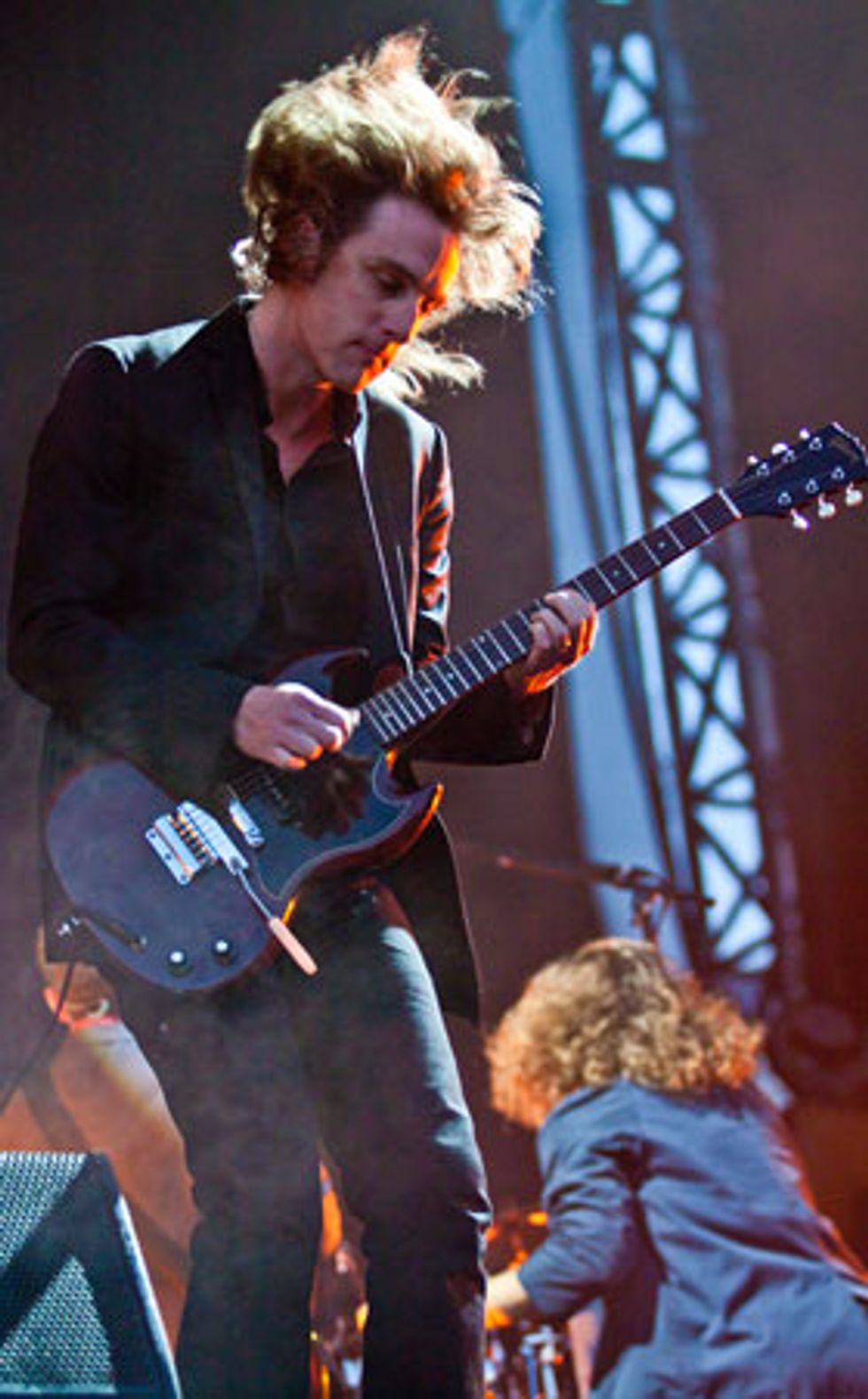
Guitarist Carl Broemel hammers out chords on his 1960s Gibson SG Jr. during MMJ's opening song "Victory Dance" for their Day 2 headlining set at Lollapalooza 2011 in Chicago's Grant Park.
Photo by Chris Kies.
Carl Broemel: I don’t remember deciding to play music—I was just kind of doing it. My dad is retired now, but he was a bassoon player in the Indianapolis Symphony. I was always taking violin or piano lessons and hanging out with him. But I do remember deciding around age 12 or 13 that I didn’t want to take violin lessons anymore, and that I wanted to try saxophone, flute, or guitar. Once I started playing guitar, I just felt that connection. Hearing a song on the radio, getting excited, and then being able to do it myself was like, “This is awesome! I get this, and I think I want to keep doing it.” My dad was like, “Really?!”
Who were some of your heroes?
Broemel: When I was in middle school, I would’ve given anything to be in Bryan Adams’ band. He was the guitar player [laughs]. I was into metal, Van Halen, and stuff like that. I remember seeing Europe play at the Indiana State Fairgrounds and thinking it was amazing. There was something about the way Eddie Van Halen played that reminded me of classical music. All along, my dad was trying to get me informed, saying, “If you like Eddie Van Halen, you should listen to Segovia too.”
What was your first guitar?
James: My bud Aaron’s dad had gotten a white Harmony strat. We walked in and saw it lying on the table one day and were both filled with awe. It’s so funny to look back now at that $100 guitar, but we’d never seen anything like it in the flesh, and we wanted to know it in every way we could. Aaron played that, I got a Fender Squier Stratocaster, and we just started going for it. From that moment on, I was possessed, just captivated. And it hasn’t let me go.
Broemel: I had some super-cheap, small, blue-and-white electric guitar—I don’t even know what brand it was. It looked like a Teisco, but even cheaper and crappier. We plugged it into car stereo speakers, which were fun because they distorted. I got a Yamaha heavy metal guitar after that.
Carl Broemel plays his GFI S-10 pedal steel during the closing set of the 2012 Newport Folk Festival. Broemel says his pedal-steel studies will be a “lifelong journey.” Photo by Tim Bugbee / Tinnitus Photography.
How has being from Kentucky informed My Morning Jacket’s sound?
James: We’ve always taken a lot of pride in being from Louisville. It gives us a different perspective on the world. I think people confuse Louisville if they’re not from here. Northerners think it’s a Southern place, and Southerners think it’s a Northern place. We’re not Nashville, Chicago, New York, or L.A. We’re our own special thing that we really identify with. I think people who come here to play shows or to visit can feel that energy as well.
Broemel: I’m from Indiana, but we feel at home in Louisville. The trees are big. It just feels like a nice old, mid-South town that’s been there forever. It feels like they hold onto history there—more so than a place like Nashville, which seems like it’s turning over. I like Kentucky because it feels like it’s filled with ghosts.
James: There’s a forest here, and there are so many trees. We always talk about how the trees hide the ghosts and that they live in the trees. If the trees weren’t here, the ghosts wouldn’t have anywhere to go—they’d float off into space or whatever. For some reason, there’s a heavy magnetic concentration of ghosts here, like in New Orleans. Every place has ghosts, but there are some really special ghosts here.
Environment seems to inspire MMJ. Tell us about the vibe of Stinson Beach, California, where you recorded The Waterfall.
James: It’s like being on Mars or something. I’ve described it as like being on the moon, but the moon is cold and dark, and it’s definitely not cold and dark there. Everything is heightened. Everything is broadened. Being near the ocean is really powerful. It was the first time I’d made a record where I could look at the ocean the whole time we played. That was very profound. The redwood forest and Muir Woods are there, and the sunsets on top of Mount Tamalpais are so epic and beautiful. Everything was more dramatic, but in a very peaceful way. It felt like we were the only people there, existing on our own little planet.
Broemel: It was amazing! It was like the ultimate vacation. We lived in houses on the beach and could hike up to the studio in the morning and hike back at night. You could take a 45-minute walk on the beach and through the forest to the studio. We’d take nighttime walks on the road and look at the stars. It was a nice ceremony of going to work and going home.
Jim James' Gear
Guitars
1962 Gibson Barney Kessel
Custom 2008 Breedlove Revival 000
1950s Martin 000
Gibson J-185
Gretsch Super Axe
1999 Gibson Flying V
1975 Fender Strat
Two Gibson ES-335s
Amps
3 Monkeys Orangutan head and 2x12 cabinet
Mesa/Boogie Trem-O-Verb head
Effects
Boss BD-2 Blues Driver
Boss RV-3 Digital Reverb/Delay
Boss TU-2 Tuner
SIB Mr. Echo
ZVEX Box of Rock
ZVEX Woolly Mammoth
EarthQuaker Devices Monarch Overdrive
EarthQuaker Devices Ghost Echo
Malekko Spring Chicken Reverb
Strings and Picks
D’Addario EXL115 sets (electric)
D’Addario EJ17 sets (acoustic)
Dunlop Tortex .88 mm picks
Jim, do you have an obsession with waterfalls?
James: [Laughs.] For a little while I have. I wrote the song about the waterfall, and I’ve been collecting old pictures of waterfalls in antique stores and from eBay—cool waterfall pictures people took on vacation, or whatever.
What is it about waterfalls?
James: I firmly believe there’s not always a rational explanation for everything. Some of the biggest things of life can’t be explained. Why did this person die in a car wreck yesterday? Why did this person live to be 95? There are all these things you can’t explain. I just feel called to some things, and for whatever reason, I felt called to the waterfall. When I see a waterfall, I feel this crazy sense of everything. It’s so violent, and you know it could smash and kill you, or you could fall off it and die. But it’s also so peaceful, so hypnotic and natural. I always have this urge to pause it like a video, go back behind the waterfall, lie down in the cave, and just get some rest. I feel like life is a waterfall. It’s rushing at you so fast, and you can’t control it. You feel so overwhelmed by life that you need to pause and stop it, in a good way. I was thinking about that when we were mixing in Portland, Oregon. There’s a drive where you can see some beautiful waterfalls. I drove there a couple times just to clear my head, and that cemented the feeling that the waterfall was the right image for the record.
Take us inside My Morning Jacket’s songwriting process.
Broemel: It changes, depending on the song. It used to be more explicit: Jim would come in with fleshed-out ideas that were basically demoed at home. Now he spends less and less time finishing demoes, leaving it more open-ended. He’ll even just sing a melody into his phone, or send us a fast acoustic guitar demo. On the last record and this one, we didn’t do any preproduction. We didn’t rehearse. We just set everything up and started recording. We record the song in every manifestation until we finally think it’s done. We kicked those songs around a lot! If the gods are with you, after a day or so, you’ve got it [laughs].
Jim James will always love his Flying V, but lately his go-to guitar is a 1962 Gibson Barney Kessel, played here while wearing his new favorite jacket. Photo by Dave Vann.
Jim, do you write on a particular guitar?
James: It’s changed over the years. My parents gave me a Takamine acoustic guitar when I was a kid, and I wrote on that for years and years. But I’ve developed a new way of writing: I write in my head, and then just grab whatever guitar is around. I keep just a couple of guitars at home. I’ve got an old 1950s Martin parlor guitar and a Gibson ES-335. I wrote a lot of The Waterfall on a Gibson Barney Kessel I found that I really love. Last night I was playing another favorite: my mom’s guitar when she was a kid, just an old, no-name kid’s guitar from the ’50s.
My Morning Jacket is a live-to-tape kind of band, but this time you tried a more digital approach.
James: When I did my solo album [Regions of Light and Sound of God] I worked a lot by chopping things up on the computer and putting them in strange places to see what that sounded like. I got to do some of that on this record because there were a couple of songs, like “Spring” and “In Its Infancy,” where I didn’t know what I wanted the end result to be, though I knew all the parts. So we would do the parts live to tape, and then I would go into the computer and move them around, trying to create happy accidents.
Broemel: Yeah, that sums up the record. We still set up, played together, and recorded to tape in our “normal” way. But there were a few songs where we just recorded sections, and Jim made a collage out of them on his computer. Then we relearned it and replayed some of it on top of that. “Spring (Among the Living)” was the song where we used a completely new method.
Being in the studio is the ultimate balancing act. Today’s technology is daunting, and there are so many ways to look at it as a guitar player: “Do I use all analog gear? Do I use Axe-Fx?” I saw Les Paul play at the Iridium before he passed away, and the guy who invented multi-tracking had a Line 6 reverb pedal. He just used what was available and didn’t question whether he should because of some moral standard.
Carl Broemel's Gear
Guitars
Duesenberg Starplayer TV
1960s Gretsch Tennessean
1988 Gibson Les Paul Standard with Bigsby
GFI S-10 pedal-steel guitar
1960s Gibson SG Jr.
Gibson Les Paul Jr.
Gibson Les Paul goldtop
Duesenberg Caribou
Duesenberg Double Cat 12-string
Amps
Fender Princeton Reverb
Tweed Fender Deluxe
Fender Vibrosonic (for pedal steel)
3 Monkeys Orangutan
3 Monkeys Grease Monkey
Carr Slant 6V
’67 Fender Vibrolux
Magnatone Twilighter
Maestro Reverb-Echo
Effects
Roland Space Echo
Eventide H9
Electro-Harmonix POG
Electro-Harmonix Freeze
Fulltone Full-Drive 2
Fulltone Tube Tape Echo
Durham Electronics Sex Drive
SIB Mr. Echo
Boss RV-5 Digital Reverb
Hudson Electronics Stroll On Fuzz
Spaceman Saturn V Harmonic Booster
Spaceman Sputnik
Xotic SP Compressor
Fulltone Supa-Trem
Pete Cornish buffers
Empress Tape Delay
Fulltone Wah
GigRig G2 pedal switcher
Vox Tone Bender
Hilton volume pedal (for pedal steel)
Moog Analog Delay (pedal steel)
EarthQuaker Devices Dispatch Master (pedal steel)
Eventide ModFactor (pedal steel)
Strings and Picks
D’Addario EXL 115s
Signature yellow Dunlop Tortex .73 mm picks
So the collage method worked out?
James: Oh, I love it. That’s the amazing part about where we are now. I think we have to be in the middle, for recording especially. You have sounds from yesterday—tape and old microphones—and you have the technology of today, which is what can make us different. That’s why the retro mindset—and I used to be like that myself—is a limited and uneducated way of thinking. Digital technology has gotten to where it sounds really amazing. It’s not the ’90s anymore. If you ignore the world of the computer, you’re staying in the past. And it’s a really fun world!
What’s your favorite guitar of all time?
Broemel: It’s a tough call. The Duesenburg Starplayer TV is awesome, but if I lost my black Les Paul I’d be crushed. I’ve had it for so long that there’s a spot on the back of the neck that I made over years and years. I’ll have that one forever. You always get hot and bothered about your new guitars and gear, but it’s nice to have something you can always go back to.
James: All guitars are like different spirits that feel good for some things but not right for others. Lately the Barney Kessel has felt right for all the new stuff, but then there’s older stuff where my Flying V feels right. My main acoustic touring guitar is a custom Breedlove. I love it because acoustic guitars normally sound like shit live, but this thing really sounds good.
Do you still play your Flying V a lot live?
James: Yeah, there are certain songs where only the V will do. It’s like a sword or something—even if I haven’t played it in a while, it’s like an old friend that comes right back to me as soon as I pick it up.
How do you split guitar duties? Broemel: We just kind of pass it around. I wait and see what [Jim] wants to do, let him establish what he wants to cover, and we let it fall into place and trade off things. There’s no “I have no solos on this record!” attitude.
James: It’s fun to work with Carl because we’re very different. He’s such an emotional player, but also so educated. He knows different chord combinations and he knows what notes he’s playing, He can play pedal steel, and he’s so interested in switching out pedals and the speakers on his amps—he’s constantly doing research. I’m the exact opposite: I’m like a three-year-old child, happy to bang on the guitar as long as nothing breaks. I sometimes find a new guitar or pedal or whatever, but they usually find me. I don’t usually want to do all the technical stuff that Carl’s so great at.
A lot of times Carl reinvigorates my desire to play. I love playing guitar, but sometimes I get tired of it as a vehicle and want to use something else. I don’t have an undying love for the guitar above all else—I also love keyboards and bass. Before this record, I thought, “I’ll just sing—I don’t even want to play.” But then Carl comes in with, like, some new weird reverb tank. He’s really good at bringing my guitar playing back to life.
Carl Broemel’s favorite guitar is a 1988 Gibson Les Paul Standard with a Bigsby. “I’ve had this guitar for long enough that there’s a spot on the back of the neck that I made over years and years,” he says. Photo by Atlas Icons / Igor Vidyashev.
You recorded enough music for two albums.
Broemel: Yeah, there’s definitely more music, and we have to wrap our heads around what we want to do with it. We’re going to try to tidy that up when we get off the road. We’re saying we’re going to put out records back to back, faster than we’ve ever done. There will be some similarities, but some of the songs on the next record are very different from what’s on The Waterfall.
Carl, when Premier Guitar last spoke with you, you’d only been studying pedal steel for a few years. How has your pedal-steel playing progressed? Do you still approach it as “an ambient thing?”
Broemel: My ambient playing is decent, but I’m still studying and learning. There’s just so many ways to look at that guitar—it’s mind-bending. It’s a lifelong journey. Sometimes you get numb to the fact that there’s so much to discover about the guitar. It’s like the biggest library in the world.
—Carl Broemel
I love guitar with evil low end, so I think “Thin Line” is very interesting. How did you approach the guitars on that one?
Broemel: Yeah, that main riff has a really long guitar bend, and then Bo added keyboards, and then we added the strings, so it’s a super-long swooping bend. It’s an eyes-rolling-back-in-your-head sound. We finished that one in a few hours, as opposed to “Spring,” which took weeks. Jim walked down the stairs, plugged into the mixing board, and played a quick solo. It was like, “Alright!” It’s fun to watch Jim play because it seems to come out of nowhere. He just plugs in and goes branggg, and it’s done.
What are some of your best memories from the Waterfall sessions?
Broemel: Jim and I had a fun gear revelation. I went to the Marin County Guitar Show just to take a break, and I brought back this reverb/echo amp made by Maestro. It has two banana clips that you clip onto your main amp, and somehow it sucks the signal in. It’s basically just 100 percent wet reverb. It was fun. Jim was having a blast. He was like, “I love playing guitar again!”
James: I’ll always remember sitting in the control room with the back door open. You could walk outside and still hear what was being played. It was just so beautiful, walking out to look at the stars, feel the breeze, and hear the music come out. I still feel that every time I hear this music. There are so many memories trapped inside this record for all of us, but that’s probably my favorite.
YouTube It
My Morning Jacket’s Carl Broemel creates swirling riffs with his GFI S-10 pedal steel while Jim James rocks his trusty ES-335 on “Big Decisions” the first single from The Waterfall.
What makes for exciting guitar playing? What still turns you on about it?
Broemel: I never question why I still love it. But I saw Bill Frisell at Belcourt Theatre here in Nashville. He did a soundtrack to a black-and-white film about the 1927 flood of the Mississippi. It was unbelievable. He’s a good example of what I love about great guitar playing. He’s got the global vision of what guitar can be. There was one section in particular where they were showing stills of Sonny Boy Williamson and a bunch of Delta blues musicians, and he played this beautiful chorale solo guitar piece. I was like, “That’s the best thing I’ve heard in so long.” You could just tell he loved those guys and their music by the way he played the piece.
James: For me it’s a vehicle of transcendence: I love it when I’m no longer there. If I’m really into a show, the “thinking Jim” no longer exists. That’s the energy of playing guitar, the energy of God, the energy of love, and I love seeing that in other people. When I see Carl shredding a solo, I see that all the troubles and worries that Carl has on a day-to-day level are gone, and he’s somewhere else. Everybody’s probably listened to Neil Young, and he’s the primary living example of that. When you see Neil Young crushing a guitar, it’s like the world is going to end, and nothing else exists. Nothing else matters. When I watch people play, that’s what I look for, no matter what they’re playing.


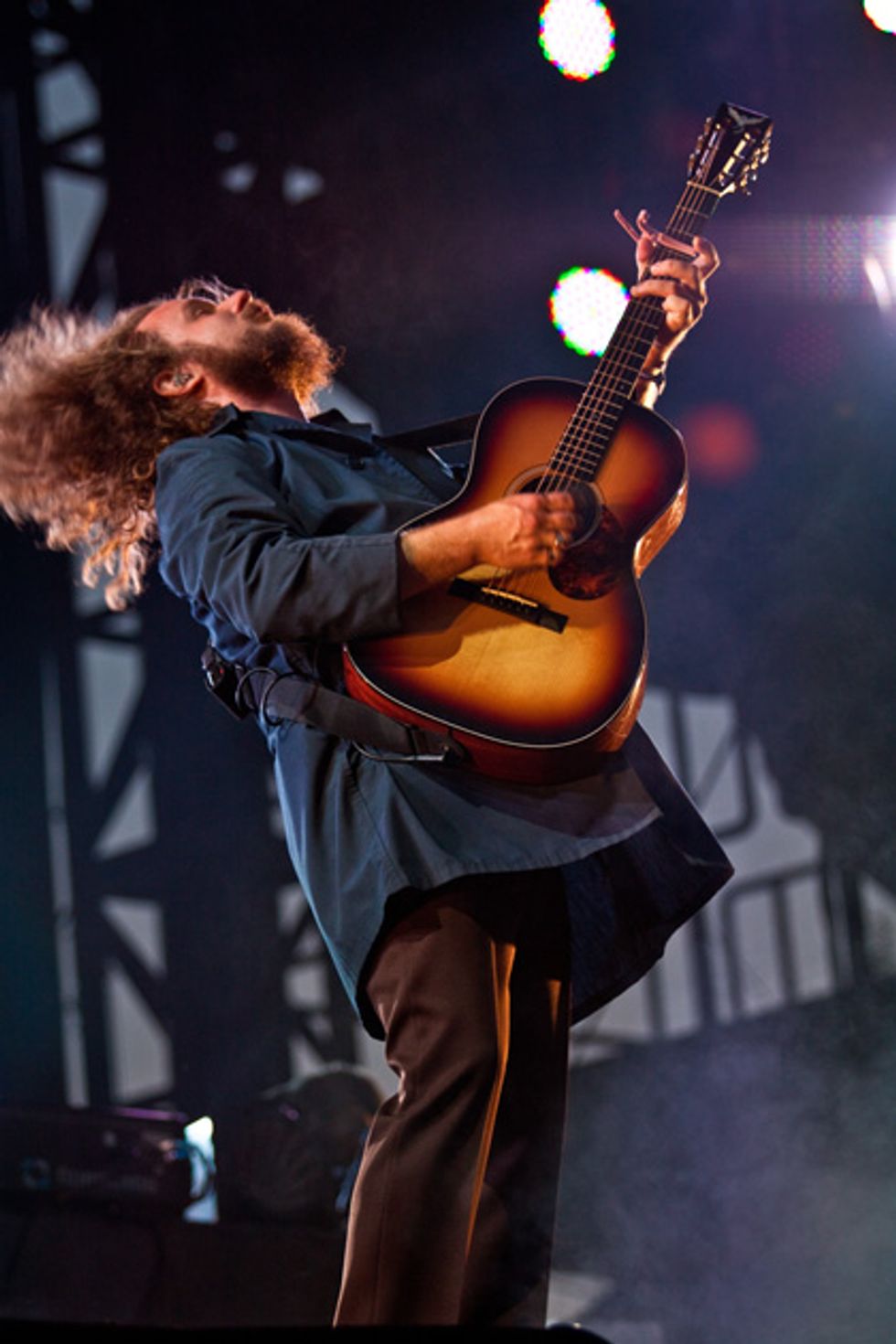



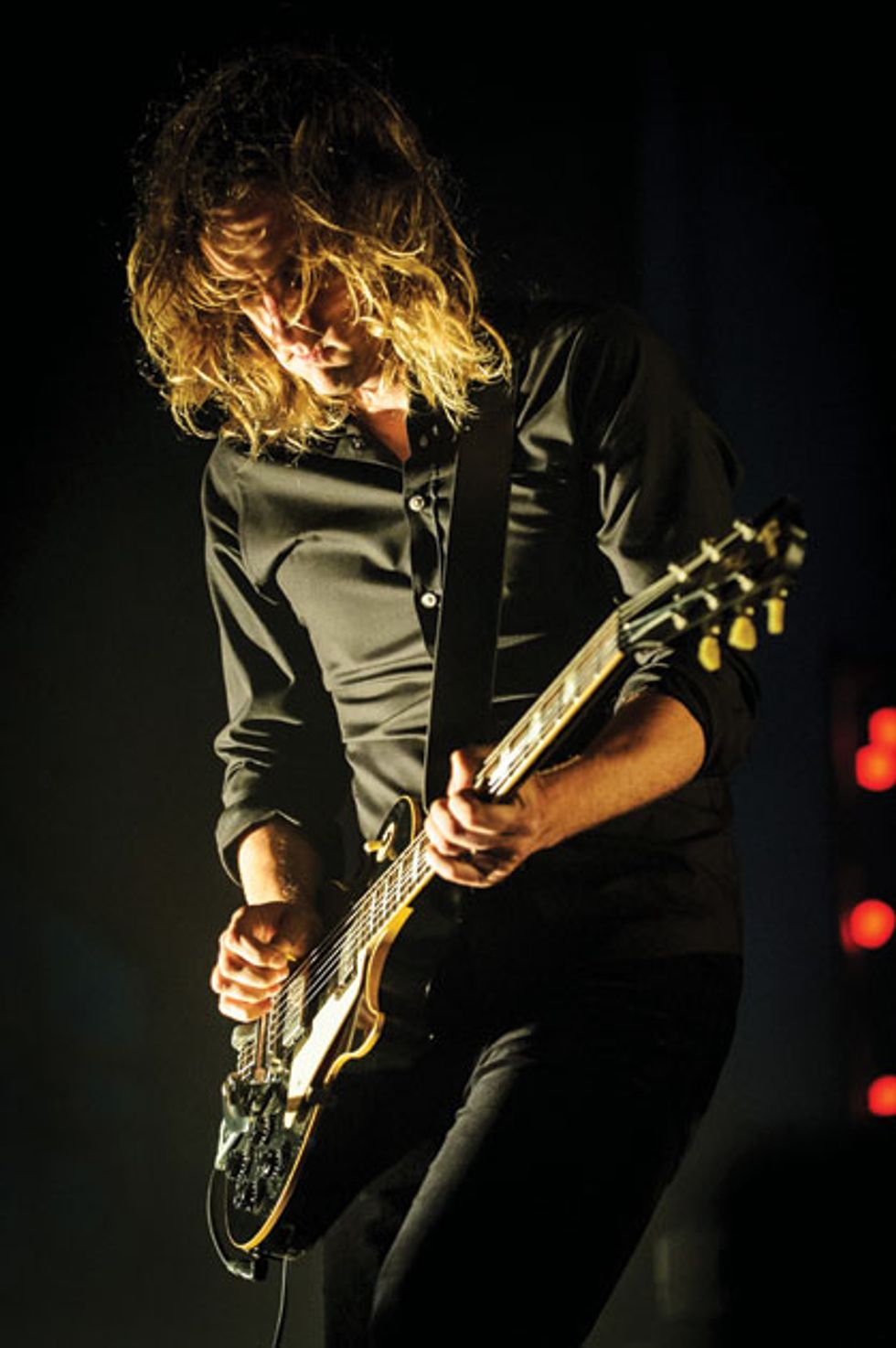





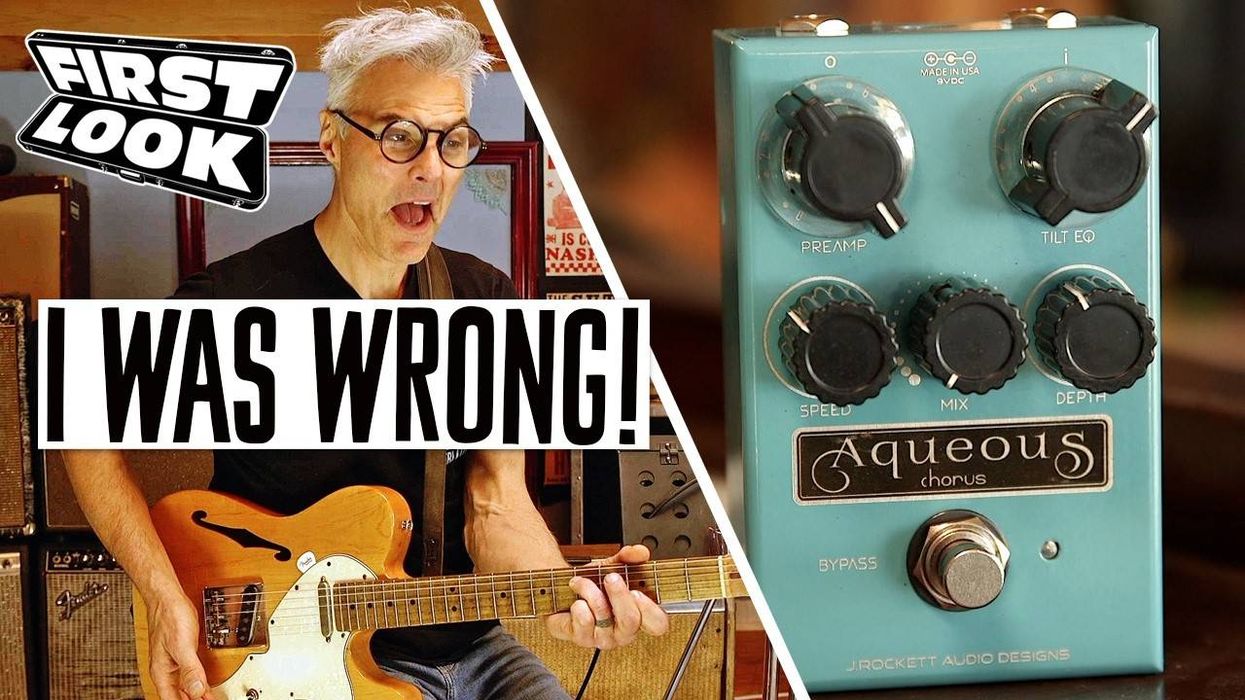

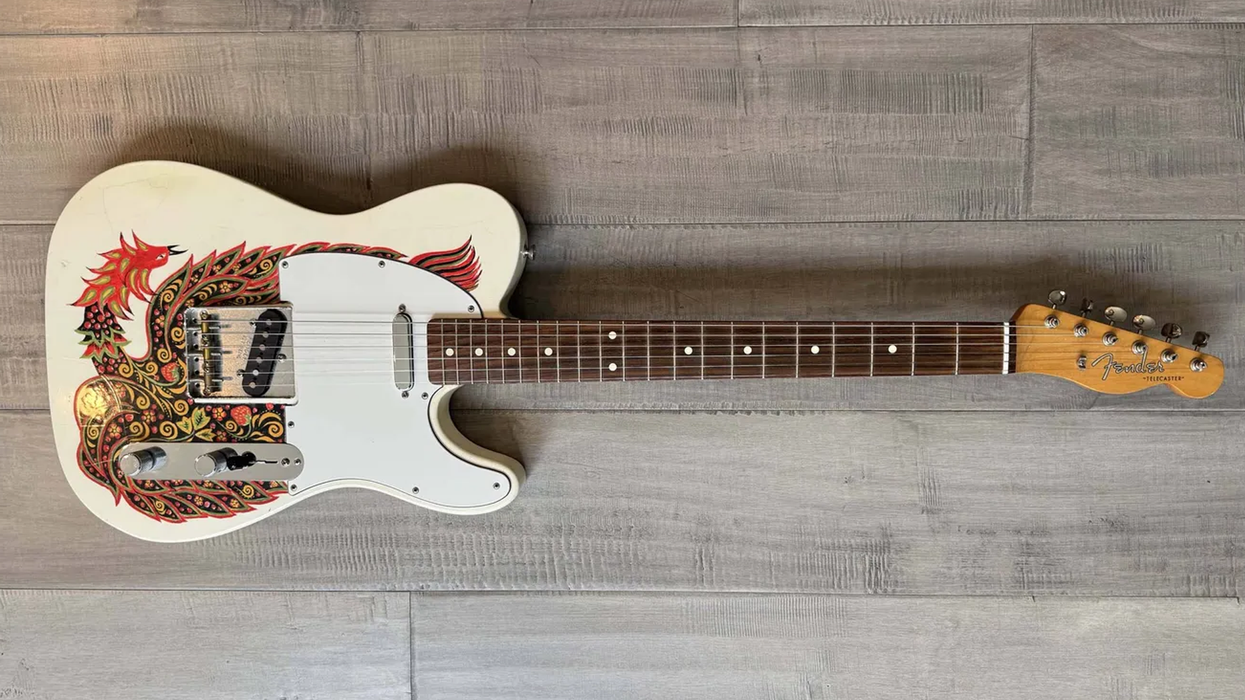
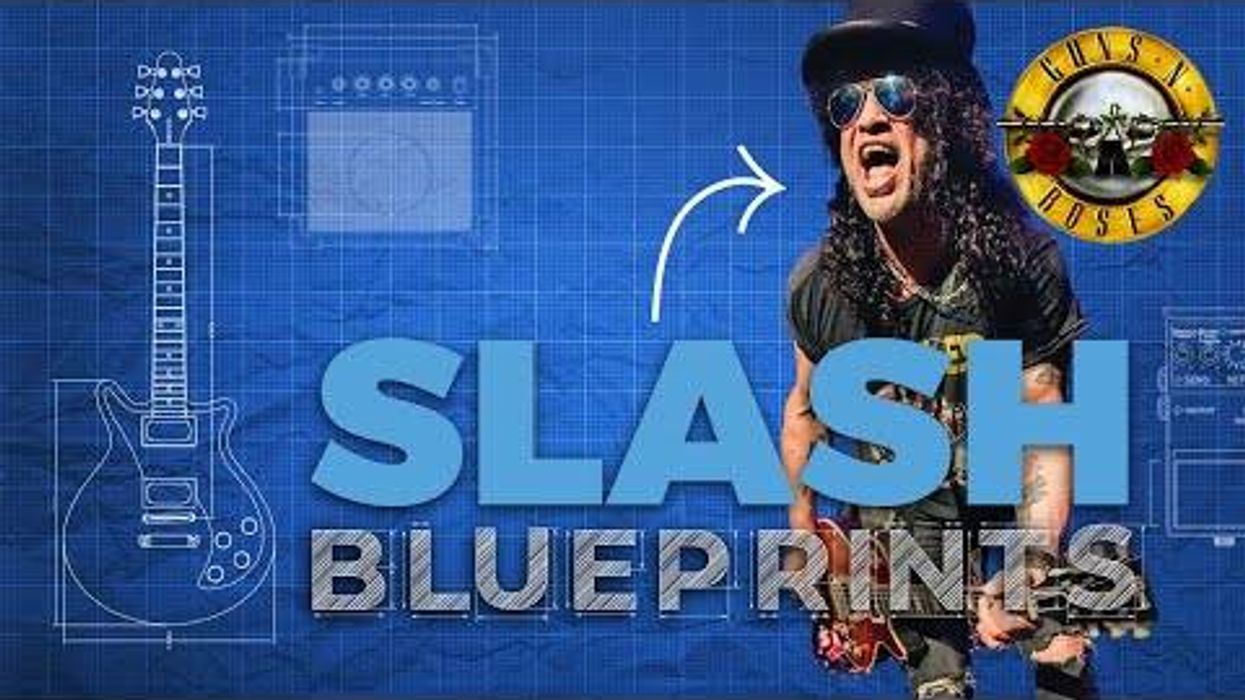

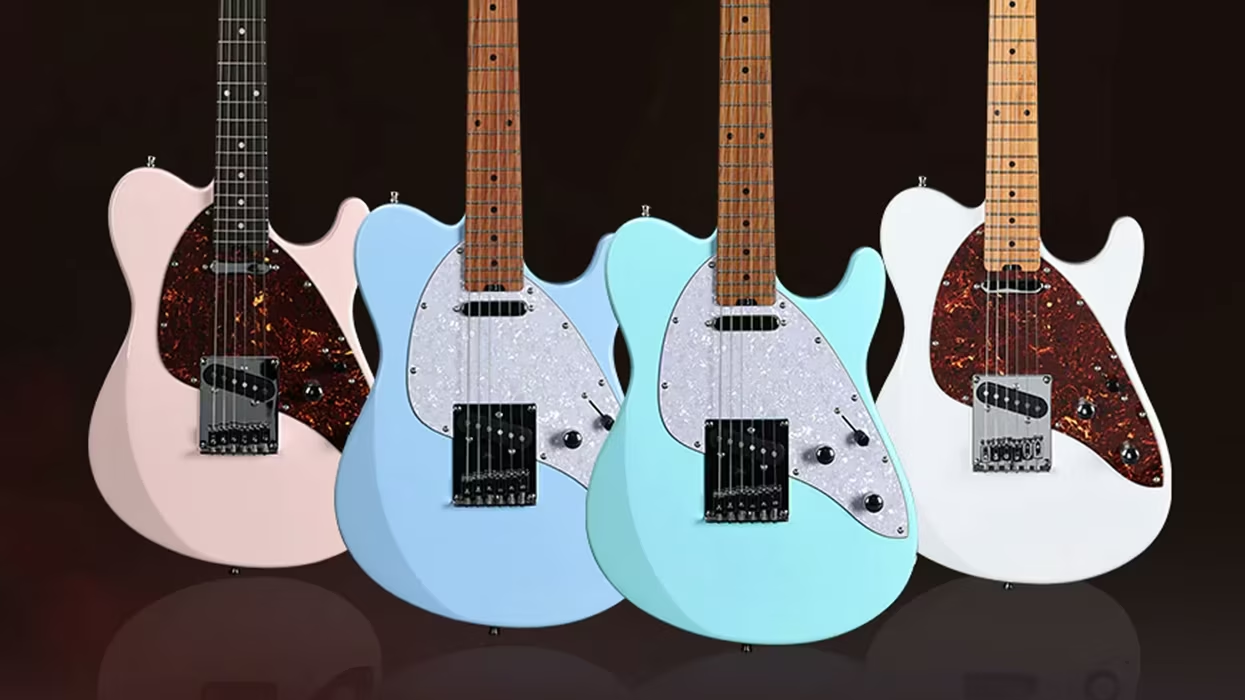
![Rig Rundown: Russian Circles’ Mike Sullivan [2025]](https://www.premierguitar.com/media-library/youtube.jpg?id=62303631&width=1245&height=700&quality=70&coordinates=0%2C0%2C0%2C0)
















![Rig Rundown: AFI [2025]](https://www.premierguitar.com/media-library/youtube.jpg?id=62064741&width=1245&height=700&quality=70&coordinates=0%2C0%2C0%2C0)




















 Zach loves his Sovtek Mig 60 head, which he plays through a cab he built himself at a pipe-organ shop in Denver. Every glue joint is lined with thin leather for maximum air tightness, and it’s stocked with Celestion G12M Greenback speakers.
Zach loves his Sovtek Mig 60 head, which he plays through a cab he built himself at a pipe-organ shop in Denver. Every glue joint is lined with thin leather for maximum air tightness, and it’s stocked with Celestion G12M Greenback speakers.






